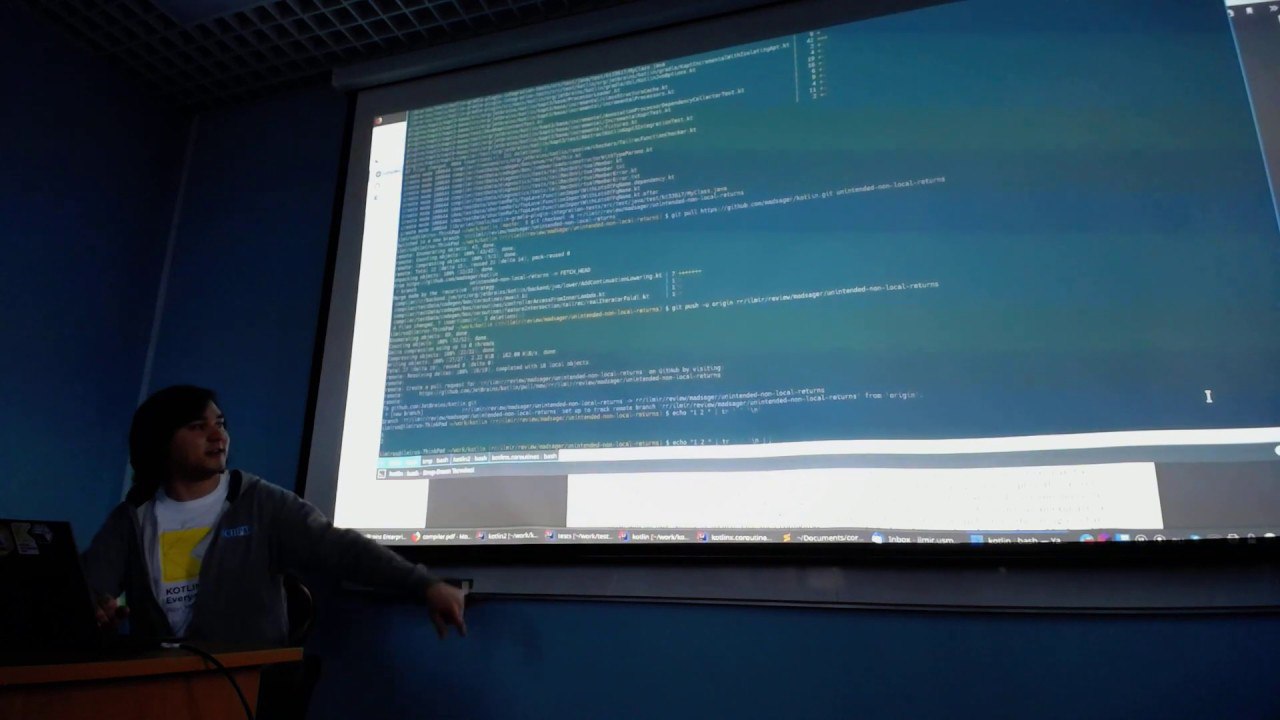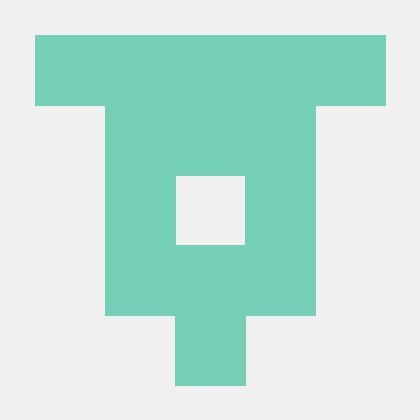VS
Size: a a a
2019 October 18
вызывать suspend’ы из Java я умею. Мне хочется научиться реализовыывать suspend функции на Java
SM
Значит я правильно всё-таки понял задачу 🙂
AN
вызывать suspend’ы из Java я умею. Мне хочется научиться реализовыывать suspend функции на Java
Это бессмысленная идея, поскольку весь смысл суспендов в том, что компилятор генерит суспешен поинты. В джаве руками их генерить очень тяжко. А почему бы просто функцию не сделать? Обычную без суспеншен поинтов?
SM
Это бессмысленная идея, поскольку весь смысл суспендов в том, что компилятор генерит суспешен поинты. В джаве руками их генерить очень тяжко. А почему бы просто функцию не сделать? Обычную без суспеншен поинтов?
Мне кажется 2 раза переписывать видимо придётся.
1. Пишем функция с Java фьючей, спокойно имплементим и используем её из Kotlin
2. Потом идём и переписываем всё на Kotlin меняя все фьючер-функции на suspend
1. Пишем функция с Java фьючей, спокойно имплементим и используем её из Kotlin
2. Потом идём и переписываем всё на Kotlin меняя все фьючер-функции на suspend
VS
Это бессмысленная идея, поскольку весь смысл суспендов в том, что компилятор генерит суспешен поинты. В джаве руками их генерить очень тяжко. А почему бы просто функцию не сделать? Обычную без суспеншен поинтов?
Если всего пара suspension мест, то я и руками напишу, нет?
AN
Если всего пара suspension мест, то я и руками напишу, нет?
Если всего пара мест, почему не написать на котлин сразу?
VS
Так я не новый код пишу, а внедряю suspend в сжатые сроки.
VS
Допустим, хочу http клиент переписать на suspend. Но весь стек вызовов до http клиента должен быть suspend.
Ⓢ
Допустим, хочу http клиент переписать на suspend. Но весь стек вызовов до http клиента должен быть suspend.
А что ты ожидаешь от внедрения suspend?
Ⓢ
Как пользователь ощутит это изменение?
VS
Cудя по всему, на этом моменте «образцовая реализация suspend функции вручную»: https://youtu.be/UzzH4biTEbY?t=1646
Т.е. точно так же можно и на Java написать.
Но, возможно, действительно проще все классы по стектрейсу сконвертировать в Kotlin.
Т.е. точно так же можно и на Java написать.
Но, возможно, действительно проще все классы по стектрейсу сконвертировать в Kotlin.
Ⓢ
@vladimirsitnikv по-возможности, ответь плз на последние 2 вопроса. Меня часто бизнес-пользователи спрашивают об этом
SM
@vladimirsitnikv по-возможности, ответь плз на последние 2 вопроса. Меня часто бизнес-пользователи спрашивают об этом
Серёж, а кого ты подразумеваешь под бизнес-пользователями JMeter?
I
Cудя по всему, на этом моменте «образцовая реализация suspend функции вручную»: https://youtu.be/UzzH4biTEbY?t=1646
Т.е. точно так же можно и на Java написать.
Но, возможно, действительно проще все классы по стектрейсу сконвертировать в Kotlin.
Т.е. точно так же можно и на Java написать.
Но, возможно, действительно проще все классы по стектрейсу сконвертировать в Kotlin.
Там нет обработки ошибок, все suspend функции возвращают Unit, нет локальных переменных, которые надо пихать в поля...
Но как-то раз я написал suspend функцию на джаве:
Но как-то раз я написал suspend функцию на джаве:
import kotlin.ResultKt;
import kotlin.Unit;
import kotlin.coroutines.Continuation;
import kotlin.coroutines.CoroutineContext;
import kotlin.coroutines.EmptyCoroutineContext;
import kotlin.coroutines.intrinsics.IntrinsicsKt;
import kotlin.jvm.functions.Function2;
import kotlin.reflect.KFunction;
import kotlin.reflect.full.KCallables;
import kotlin.reflect.jvm.ReflectJvmMapping;
import kotlinx.coroutines.CoroutineScope;
import kotlinx.coroutines.GlobalScope;
import kotlinx.coroutines.reactor.MonoKt;
import org.jetbrains.annotations.NotNull;
import java.lang.reflect.InvocationTargetException;
import java.lang.reflect.Method;
import java.util.ArrayList;
import java.util.Arrays;
import java.util.List;
import java.util.Objects;
public class A {
static Object invokeHandlerMethod(Method method, Object bean, Object... args) {
KFunction<?> function = Objects.requireNonNull(ReflectJvmMapping.getKotlinFunction(method));
if (function.isSuspend()) {
InvokeHandleMethodContinuation lambda = new InvokeHandleMethodContinuation(function, bean, args);
return MonoKt.mono(GlobalScope.INSTANCE, EmptyCoroutineContext.INSTANCE, lambda)
.onErrorMap(InvocationTargetException.class, InvocationTargetException::getTargetException);
} else {
List<Object> newArgs = new ArrayList<>();
newArgs.add(bean);
newArgs.addAll(Arrays.asList(args));
return function.call(newArgs.toArray());
}
}
}
class InvokeHandleMethodContinuation implements Continuation<Object>, Function2<CoroutineScope, Continuation<?>, Object> {
/* Continuation of caller coroutine */
private Continuation<?> completion;
/* state-machine label */
int label = 0;
/* 'captured' variables */
final KFunction<?> function;
final Object bean;
final Object[] args;
/* locals, which should be preserved between suspensions */
/* as demonstration, I save all parameters and 'newArgs' */
CoroutineScope scope;
List<Object> newArgs;
InvokeHandleMethodContinuation(KFunction<?> function, Object bean, Object[] args) {
this.function = function;
this.bean = bean;
this.args = args;
}
@NotNull
@Override
public CoroutineContext getContext() {
return completion.getContext();
}
I
Cудя по всему, на этом моменте «образцовая реализация suspend функции вручную»: https://youtu.be/UzzH4biTEbY?t=1646
Т.е. точно так же можно и на Java написать.
Но, возможно, действительно проще все классы по стектрейсу сконвертировать в Kotlin.
Т.е. точно так же можно и на Java написать.
Но, возможно, действительно проще все классы по стектрейсу сконвертировать в Kotlin.
@Override
public void resumeWith(@NotNull Object result) {
try {
Object outcome = invokeSuspend(result);
// the coroutine is suspended. Since 'resumeWith' is called on suspended coroutines and its parent is
// also suspended, there is no need to suspend it one more time.
if (outcome == IntrinsicsKt.getCOROUTINE_SUSPENDED()) return;
// coroutine has finished, wake up its parent.
completion.resumeWith(outcome);
} catch (Throwable e) {
completion.resumeWith(ResultKt.createFailure(e));
}
}
// It is easier to keep track of everything if the state-machine itself is in separate method of continuation, even for suspend functions.
// The body of suspend function will be just 'new ContinuationObject(captured variables).invoke(parameters, including completion)'
// BTW, Kotlin/Native and Kotlin/JS implement coroutines exactly this way.
private Object invokeSuspend(@NotNull Object result) {
// Check if we resumed with exception
ResultKt.throwOnFailure(result);
// State-machine itself
// For each suspend call there should be exactly one state in the state-machine.
// The state should be ended be the call followed by suspension check.\
switch (label) {
case 0:
// The variables are (un)spilled automatically as long as they are represented as continuation's fields.
// Ideally, there shall be only one local: 'result'. See suspend call's comment below.
this.newArgs = new ArrayList<>();
this.newArgs.add(this.bean);
this.newArgs.addAll(Arrays.asList(this.args).subList(0, this.args.length - 2));
// Every state in state-machine should increment the label, this way coroutine's resume will resume in
// correct spot
this.label++;
// Pass 'this' as continuation parameter. This way it will be resumed upon child coroutine's completion.
// Coroutines reuse the same variable 'result' to represent both results of suspend call and an argument of
// resumeWith function. This way, the code works correctly for all outcomes: and if the child does not
// suspend at all, and if it calls this object's 'resumeWith' upon completion.
result = KCallables.callSuspend(function, newArgs.toArray(), this);
// Coroutine is suspended
if (result == IntrinsicsKt.getCOROUTINE_SUSPENDED()) return result;
// FALLTHRU
case 1:
if (result == Unit.INSTANCE) return null;
else return result;
// FALLTHRU, but this should not matter
default:
throw new IllegalStateException("Incorrect label of coroutine: " + label + " when 2 is maximum value");
}
}
@Override
public Object invoke(CoroutineScope coroutineScope, Continuation<?> continuation) {
this.scope = coroutineScope;
this.completion = continuation;
// The initial result does not matter as long as it is not Result.Failure. It gets thrown away anyway.
return this.invokeSuspend(Unit.INSTANCE);
}
}
В принципе, я постарался все места, которые могут быть непонятны, откомментировать.
Это, если кому любопытно, я переписал функцию https://github.com/zhangll00/spring-framework/blob/9b33b0ad58dcda1e3ea803d0c6468e17b24a4ad2/spring-core/kotlin-coroutines/src/main/kotlin/org/springframework/core/CoroutinesUtils.kt#L63
Ⓢ
Серёж, а кого ты подразумеваешь под бизнес-пользователями JMeter?
Jmeter это промежуточный инструмент. Ты для кого свою программу пишешь?
SM
Jmeter это промежуточный инструмент. Ты для кого свою программу пишешь?
Ну я и JMeter не пишу 😀 Просто мне кажется, что по данному вопросу основные бенефициары будут контрибьютеры JMetet, а не бизнес-пользователи.
Ⓢ
Я не понял, причём здесь JMeter.
Ⓢ
Коллеги! Требуется найти ответ на вопрос бизнес-пользователя-не-программиста - какие выгоды он получит, если программисты будут писать программы с помощью корутин. Нужно два коротких и простых ответа: а) для бэкенда б) для фронтэнда (веб+мобилки).
SM
Я не понял, причём здесь JMeter.
Ты кажется упустил самое начало 😀 Володя мейнтейнер JMeter и его вопрос про suspend функцию был задан именно с контекстом кодовой базы JMeter





